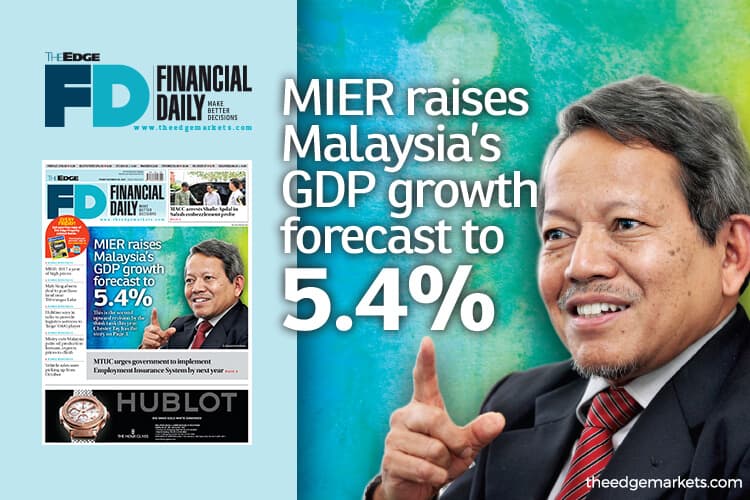
This article first appeared in The Edge Financial Daily on October 20, 2017
KUALA LUMPUR: The Malaysian Institute of Economic Research (MIER) projects that the domestic economy will grow by 5.4% in 2017, an upward revision by 0.7 percentage point (ppt) from July’s forecast.
This is the second revision by the think tank this year. In July, it raised the gross domestic product (GDP) growth forecast to 4.7% from 4.4%.
At the press conference on the Malaysian economy’s third-quarter outlook yesterday, MIER executive director Emeritus Professor Dr Zakariah Abdul Rashid said GDP growth is being supported by stronger domestic demand due to improvements in investment, consumption and better exports.
“The external sector continues to progress as world trade activities strengthen. The global economy is expected to grow stronger than expected, underpinned by [a] faster growth in the advanced economies as well as the continued improvement in the emerging market and developing economies,” Zakariah commented.
“The recovery in manufacturing and trade is gaining momentum, further strengthened by stronger investment activities and buoyant financial markets,” he said.
Zakariah said MIER’s annual GDP growth forecast reflects that Malaysia’s fourth-quarter GDP would experience lower growth.
“Our economy grew 5.7% in the first half of this year, and we are forecasting 5.4% for annual growth, reflecting that we are projecting slower growth in the second half,” he explained.
Zakariah said the projection has taken into account MIER’s Business Conditions Index, which involves a survey of over 300 manufacturers in Peninsular Malaysia.
“The manufacturers told us that [they] experienced poor sales, [a] slowdown in production and lower domestic and export orders during [the] third quarter of this year, but they are expecting some recovery in the fourth quarter,” he said.
That said, Zakariah commented that growth in GDP may not translate into better welfare for the man in the street.
“GDP does not represent people’s welfare or household income. GDP is the overall of the economy, and people’s welfare is part of an economy,” he explained.
Citing data from the country’s statistics department, Zakariah said the real increment for household income was 3.7% between 2014 and 2016.
“What we experience now is less than what we could have experienced back in 2014, because our median household income growth may not necessarily [be] higher than inflation. 2017 is a year of high prices; the high inflation phenomenal has contributed to lower real income. [For the] first eight months of this year, the average 4% inflation in Malaysia was considered high,” he said.